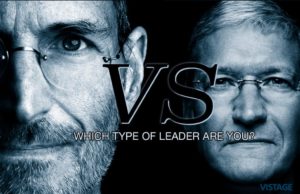How does your personality affect your leadership? (part two in a series)

Read Part I of this two-part series here.
After the death of Steve Jobs, Tim Cook was selected as the CEO of Apple, Inc. Cook’s personality is very different from his predecessor’s, and just like you, his personality influences how he leads his company.
There are many ways to evaluate personalities and my preferred system is The Enneagram, which recognizes nine distinct personality ‘types.’ It differs from other personality assessments in that it requires introspection and self-discovery.

You are the only one with access to your own internal “wiring”, so, only you can determine what your personality type is. Online tests can help you rule out Types that are not a fit, but they do not give you the final result; you discover your own Type. Although we can observe certain distinctive traits in others that give us hints of their Type, the ethical use of the Enneagram dictates that we never decide that for others.
Using Steve Jobs and Tim Cook as examples, let’s review their different personalities and the effects of those differences on Apple. Based on available information about their behaviors, Jobs seemed to be an Enneagram Type 8 and Cook a Type 1. Here are some of the traits of each Type:

Type Eights:
- Believe that the world is a hard place and only the strong survive. They are concerned about power, control and making an impact.
- Are natural leaders with big personalities who love a challenge. When Jobs was alive, there was never any question about who was in charge!
- Have a laser-like, often excessive focus. Not only did Jobs focus Apple on a few key projects at a time, he was obsessive about controlling every aspect of the user experience of their customers.
- Have an enormous will to get THEIR way. Jobs would push his teams to deliver the seemingly impossible and not settle for anything less.
- Are aggressive, direct and self-confident, often finding it difficult to manage their anger. Jobs was famous for his temper tantrums and making provocative, even demeaning, statements that bullied others.
- Eights can be charismatic, manipulative and impulsive. Although he could be abusive at times, Jobs was also known for his ability to inspire people.

Type Ones:
- Believe they must be good and right to be successful. They focus on what is right and wrong and strive to live up to their own exacting values and ideals.
- Make personal sacrifices for a higher mission. Cook takes a public stand on major societal issues and supports philanthropy. He vehemently opposed repeated government requests to unlock iPhones, because he felt that would violate civil liberties.
- One’s distrust their “gut” feelings, so they suppress and control them. Cook’s style is reserved, methodical and even-keeled.
Tim Cook’s calm composed personality contrasts starkly with the mercurial nature of Steve Jobs, and inevitably, so does his leadership style. Jobs was a product person who didn’t care about others’ feelings, while Cook is a consensus-driven, people-focused leader who delegates. With the change of leaders, Apple’s culture is also changing. Some criticize Cook for dousing the passion that fueled Job’s stream of new product launches. Others praise him for his more humane treatment of his employees. Either way, Apple is a different company five years after Cook took the helm.
Our personalities underlie and affect all of our thoughts and actions. Great leaders understand their own personalities and how they affect their leadership styles. To understand yourself better, discover your own Enneagram Type. It will provide you with some valuable insight into how you lead, and why.
Category : Leadership

